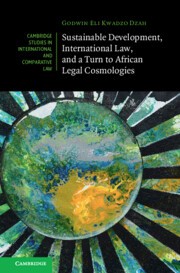Book contents
- Sustainable Development, International Law, and a Turn to African Legal Cosmologies
- Cambridge Studies in International and Comparative Law: 185
- Sustainable Development, International Law, and a Turn to African Legal Cosmologies
- Copyright page
- Dedication
- Contents
- Foreword
- Preface
- Acknowledgements
- Abbreviations
- Introduction
- Part I Mise en Scène
- 1 The Rise, Fall, and Rise Again of Sustainable Development
- 2 The Logic of Sustainable Development
- Part II Universal, Pluriversal, and in Between
- Part III Thinking Alternatives
- Bibliography
- Index
- Cambridge Studies in International and Comparative Law
2 - The Logic of Sustainable Development
Law, Politics, and the History of an Idea
from Part I - Mise en Scène
Published online by Cambridge University Press: 16 May 2024
- Sustainable Development, International Law, and a Turn to African Legal Cosmologies
- Cambridge Studies in International and Comparative Law: 185
- Sustainable Development, International Law, and a Turn to African Legal Cosmologies
- Copyright page
- Dedication
- Contents
- Foreword
- Preface
- Acknowledgements
- Abbreviations
- Introduction
- Part I Mise en Scène
- 1 The Rise, Fall, and Rise Again of Sustainable Development
- 2 The Logic of Sustainable Development
- Part II Universal, Pluriversal, and in Between
- Part III Thinking Alternatives
- Bibliography
- Index
- Cambridge Studies in International and Comparative Law
Summary
Chapter 2 analyses some foundational ideas relied upon in the book. This conceptual base comprises an analysis of nature, the environment, development, and sustainable development. These concepts are discussed as a progressive movement of a complex ideation: where nature is conceptualised as the starting point, later becomes the environment, then advances to become development, and is finally transformed into sustainable development. I employ Third World Approaches to International Law (TWAIL) in my analysis of neo-imperial ideologies and allied Eurocentric philosophies and how these are embedded in the contemporary language of sustainable development. At each stage of the analysis, I highlight the significance of human agency as the defining character of the transformations that occur within this conceptual fluidity. It accounts for the persistence of the subtext of Eurocentrism and demonstrates how the interplay of law, politics, ethics, and history as sustainable development is established upon different elements of both law and non-law theories. The analysis in this chapter is refracted through ’Afrosensitivity’, which I describe as a reaction to Africa as a conceptual tool in sustainable development discourse, and as a conscious, alternative route for imprinting African legal cosmologies on this global phenomenon called sustainable development.
Keywords
- Type
- Chapter
- Information
- Publisher: Cambridge University PressPrint publication year: 2024
- 1
- Cited by

